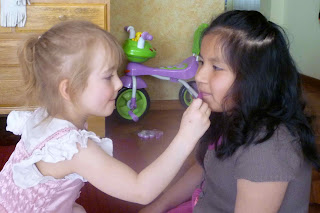Dear Friends,
What holds people in poverty? – At the beginning of August Ed took part in the annual evaluation of the work zones in Cochabamba. During this time he discovered two factors that hold people in poverty. The first of these was geographical. A large number of the communities that FH works with exist between an altitude of 2,500m – 4,000m+ above sea level (Ben Nevis the highest mountain in the UK is 1,344m). Families in these regions generally live off of the land of which they may have 1.5 - 2 ha. Living at this altitude is harsh with limits on what can be grown because the geographical conditions are tough. Just by dropping down a few hundred metres the conditions become more favourable for growing a greater variety of crops. However, in these lower regions, people are still living in poverty, therefore it is due to more than just simple location.
The second and greatest factor that holds people in poverty is their Worldview (the way a person or culture interprets the world around them and how they react and interact within it). There are 3 main world views (animism, secularism and biblical theism) as well as a variable mix of all 3. In Bolivia the animistic worldview is the greatest where by the spirits control the physical world. A person can do nothing to change their situation therefore the result is a fatalistic people. So whether a person lives at 4000m above sea level or 100m it makes no difference if a person was born poor they will always be poor and so will their children. This belief system is particularly strong in the rural areas (including the Churches) and further compounded by being told by outsiders that they cannot do anything by themselves without outside help.
FH has worked hard in these areas for the last 10 years seeking to chang peoples worldview little by little. After all this time some have still not grasped the idea and continually look for handouts. However, with others there is encouragement seeing where slowly people are beginning to change the way they think and do things realising that they are able to change their current situation, that creation is not something to be worshiped but something they can have dominion over.
Don Nacho was one such person who back in 2003 had nothing. With the help of FH and other organisations he has experimented with new ideas and farming methods such as a trout farm.
With such a radical mind shift and way of life required, FH has identified the need to work with and strengthen the local churches. Many people here are first generation Christians and so their faith is often mixed with animistic beliefs and Catholic traditions from their colonial past. Therefore the churches need to be equipped to teach the truth of the bible so that this generation and the ones to come can learn the truth about the creator of the world and what that means to their outlook and way of life.
Thank God for:
- A healthy family
- Being a part of Gods work changing lives here in Bolivia
- Godly leaders from whom we are learning so much
Ask God for:
- Wisdom and patience in raising our children
- Greater cultural understanding for walking with our work colleagues
- Greater centralization and strengthening of the work FH is doing with local churches





















